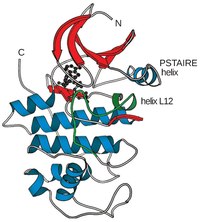
How Single Site Mutations Can Help Understanding Structure Formation of Amyloid β1-40.
Sign Up to like & getrecommendations! Published in 2023 at "Macromolecular bioscience"
DOI: 10.1002/mabi.202200489
Abstract: Amyloid fibrils represent the structural endpoint on the energetic (mis)folding landscape of very many proteins. Physiologically, amyloid fibrils are observed as a characteristic hallmark in misfolding diseases often associated with degenerative and neurodegenerative disorders. In… read more here.
Keywords: site mutations; structure; help understanding; mutations help ... See more keywords

Functional analysis of 22 splice-site mutations in the PHEX, the causative gene in X-linked dominant hypophosphatemic rickets.
Sign Up to like & getrecommendations! Published in 2019 at "Bone"
DOI: 10.1016/j.bone.2019.05.017
Abstract: CONTEXT X-linked hypophosphatemic rickets (XLH) is caused by inactivating mutations in the PHEX gene and is the most common form of hereditary rickets. The splice-site mutations account for 17% of all reported PHEX mutations. The… read more here.
Keywords: splice site; site; site mutations; canonical splice ... See more keywords

Catalytic Degraders Effectively Address Kinase Site Mutations in EML4-ALK Oncogenic Fusions.
Sign Up to like & getrecommendations! Published in 2023 at "Journal of medicinal chemistry"
DOI: 10.1021/acs.jmedchem.2c01864
Abstract: Heterobifunctional degraders, known as proteolysis targeting chimeras (PROTACs), theoretically possess a catalytic mode-of-action, yet few studies have either confirmed or exploited this potential advantage of event-driven pharmacology. Degraders of oncogenic EML4-ALK fusions were developed by… read more here.
Keywords: pharmacology; site mutations; catalytic degraders; eml4 alk ... See more keywords

Abstract 3426: Catalytic degraders effectively address kinase site mutations in EML-ALK oncogenic fusions
Sign Up to like & getrecommendations! Published in 2023 at "Cancer Research"
DOI: 10.1158/1538-7445.am2023-3426
Abstract: Heterobifunctional degraders, known as proteolysis targeting chimeras (PROTACs), is an emerging modality for drug discovery, and theoretically possess catalytic mode-of-action, yet few studies have either confirmed or exploited this potential advantage of event-driven pharmacology. Degraders… read more here.
Keywords: site mutations; pharmacology; kinase; catalytic degraders ... See more keywords

The origin and distribution of ‘Kokubu’-type splice-site mutations of the MLO genes in tobacco varieties
Sign Up to like & getrecommendations! Published in 2022 at "Breeding Science"
DOI: 10.1270/jsbbs.22001
Abstract: The Japanese domestic tobacco (Nicotiana tabacum L.) cultivar ‘Kokubu’ shows high powdery mildew resistance that is controlled by splice-site mutations of two MILDEW LOCUS O genes, NtMLO1 and NtMLO2. We investigated the existence of the… read more here.
Keywords: site mutations; tobacco; mutation; site ... See more keywords

Novel Missense and Splice Site Mutations in USH2A, CDH23, PCDH15, and ADGRV1 Are Associated With Usher Syndrome in Lebanon
Sign Up to like & getrecommendations! Published in 2022 at "Frontiers in Genetics"
DOI: 10.3389/fgene.2022.864228
Abstract: The purpose of this study was to expand the mutation spectrum by searching the causative mutations in nine Lebanese families with Usher syndrome (USH) using whole-exome sequencing. The pathogenicity of candidate mutations was first evaluated… read more here.
Keywords: usher syndrome; site mutations; splice site; analysis ... See more keywords

MET Exon 14 Splice-Site Mutations Preferentially Activate KRAS Signaling to Drive Tumourigenesis
Sign Up to like & getrecommendations! Published in 2022 at "Cancers"
DOI: 10.3390/cancers14061378
Abstract: Simple Summary MET exon 14 splice-site mutations occur in ~3–4% of lung adenocarcinoma cases, defining a cohort of patients which might benefit from anti-MET targeted therapy. Such therapies have yielded mixed results, however, pointing to… read more here.
Keywords: site mutations; exon splice; met ex14; met exon ... See more keywords